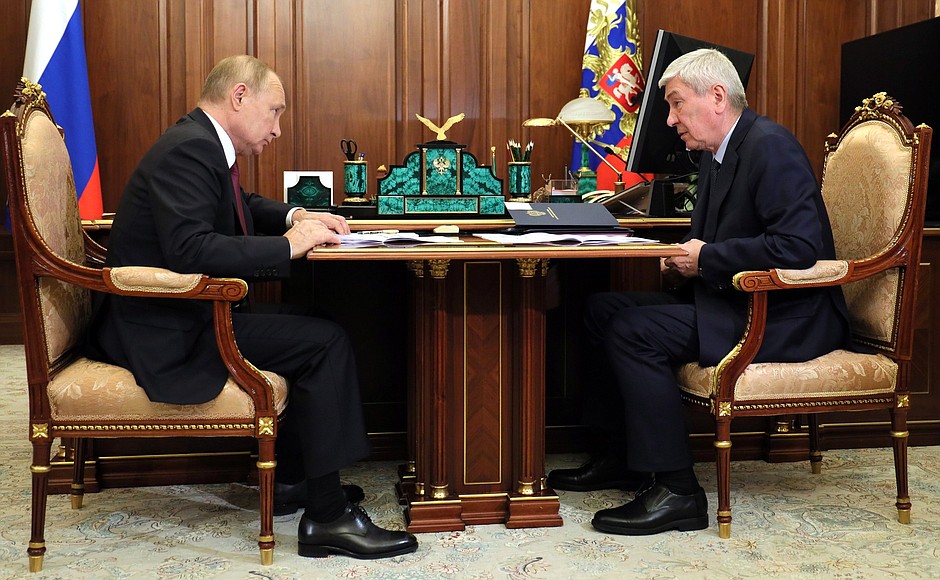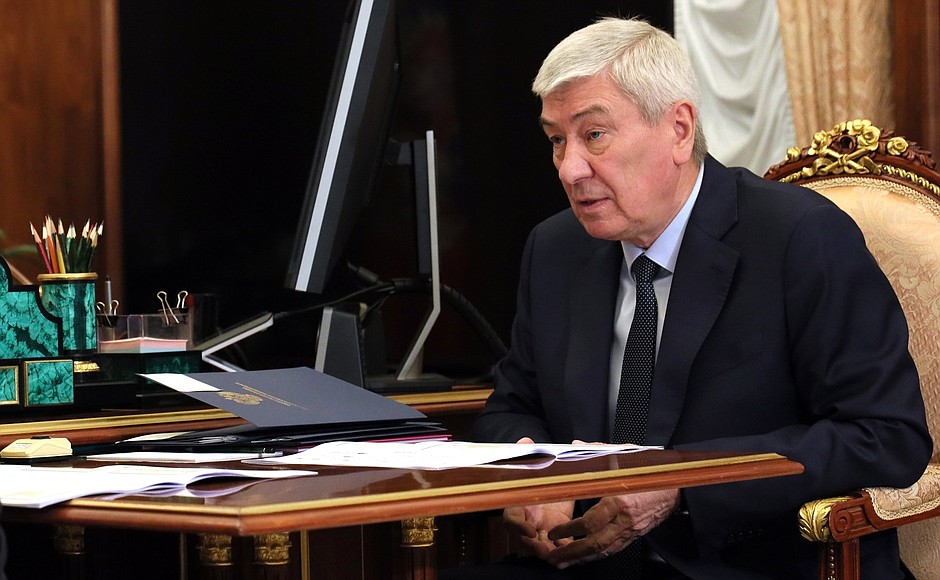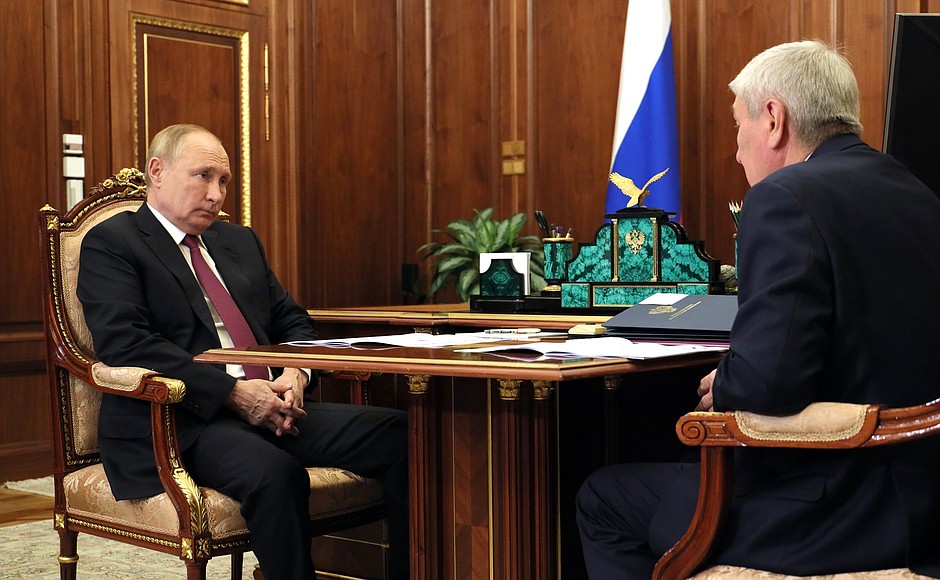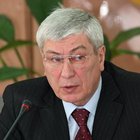President of Russia Vladimir Putin: Mr Chikhanchin, it will soon be 20 years since the mechanism for countering money laundering was established. During these years the Service has become a full-fledged financial intelligence service in the direct sense of this word.
First, I would like to congratulate you and your staff on this occasion.
Head of the Federal Service for Financial Monitoring Yury Chikhanchin: Thank you very much.
Vladimir Putin: And, of course, we will talk about current issues.
Yury Chikhanchin: Indeed, Mr President, in the past 20 years the Russian anti-money laundering service has trodden a thorny path. In 2000, the Russian Federation was blacklisted by the Financial Action Task Force on Money Laundering (FATF). This is an intergovernmental organisation that counters money laundering and financing of terrorism. A law, the third version, was signed in 2001. Thank you very much for your support on this. In 2002 we were removed from the FATF blacklist and became a full-fledged FATF member in 2003. In 2019, Russia delivered a report at a FATF plenary session, and Russia’s national system against money laundering was recognised as one of the best.
I would like to say that we have accomplished a lot during this period. More than 150 laws have been adopted. They tailored Russian law to international standards and requirements, settled the nature of relations between the parties to the anti-laundering system, and determined what transactions and financial instruments the state needed to control today.
Naturally, financial institutions, including banks, leasing and insurance companies, and specifically attorneys and notaries etc., are one of the main groups we work with in the anti-laundering system. And our task, in cooperation with the Central Bank, oversight and law enforcement bodies, the General Prosecutor’s Office, the Interior Ministry and the Federal Security Service (FSB) was to ensure, first, that all parties to the anti-laundering system follow the laws in a consistent manner; second, to improve their law abidance, and third, to create mechanisms to prevent “dirty” money from entering the financial system, primarily, banking.
I should say that we have managed to resolve many issues. I can say that since the law was passed, the number of financial sectors has increased by 4.5 times while the number of participants grew tenfold: today there are 85,000 entities who submit reports to Rosfinmonitoring, operating in the legal framework. Most importantly, compliance with the law of all financial institutions has doubled.
However, there were those who were not getting along with law. Their number has decreased threefold – some of them had their licences revoked, others just closed down whereas some became law-abiding businesses.
Countering the shadow sector was one of our priorities. We have indeed managed to lower the shadow sector volumes in cooperation with the Central Bank, the Federal Security Service, the Interior Ministry, the Prosecutor’s Office, the Taxation Service and the Customs Service. The volume of suspicious transactions went down by five times while the number of shadow scheme participants decreased fourfold.
Work is underway in the regions. These slides show how the regions are being cleaned up and transgress from the red zone into the yellow and green ones.
We undertook a lot of efforts to lower the attractiveness of shadow services. Initially the shadow services – cashing out, withdrawal of monetary funds – cost 1–1.5 percent whereas today the market price rose to 20 percent, with 40 percent on crypto currencies, so these are the costs.
Earlier the shadow venues amounted to about 100–150 billion whereas now they went down to 2–2.5. The lifespan of shadow venues was 5–6 years, while today such venues exist one year at the most and then close down.
I have already mentioned that increasing the level of law abidance was one of the priorities. In this regard, to relieve pressure on business, we switched over to a distance monitoring mechanism, that is we have practically given up on-site inspections, cutting them by 15 times. Meanwhile, distance monitoring went up by 27 times. It means we are working online through the system of client accounts.
Here are some other areas we have managed to improve. I reported to you earlier that there were high risks at the Russian Post and mobile operators as there were a great number of shadow schemes there. As of today, there are only some isolated cases there.
But I have to say that money laundering schemes have become more sophisticated. Previously only one bank was operating on the venue, nowadays a group of banks and several other companies of a different kind can be operating such as leasing companies, microfinance organisations and notaries. It means the criminals are trying to spread their activities across several sectors to hinder their identification. However, we have also learned to look for them with the help of digital technology together with the Central Bank, the FSB and the Interior Ministry.
Vladimir Putin: Is the work within the EAEU becoming easier, too?
Yury Chikhanchin: Yes, we are also active here: we have a council of heads of financial intelligence where all these matters are being discussed.
Regarding the shadow sector, we think that the key thing we managed to achieve is basically pushing them out of the Russian territory. Most shadow venues have just moved to other jurisdictions, that is, they operate outside of Russia.
Large-scale work has been done on searching and returning stolen money, primarily legalised funds. I must say that the arrests of such funds increased threefold whereas the amount of funds returned grew by six times.
But crucially, the number of economic entities involved in the shadow economy has decreased: the number of rogue companies by around 4.5 times, withdrawal of money abroad by six times, while the “transit” with the use of an intermediary company by five times.
I would like to mention another area: the criminal world began looking for new sectors to be used – those that are improperly regulated or, let’s say, lack an appropriate monitoring system. In this respect we have problems with notaries, labour disputes commission and courts. We have more or less rectified, together with the Supreme Court, the Prosecutor General’s Office, the FSB and the Interior Ministry, the situation with courts, and the curve is coming down. However, work is ongoing with notaries and the labour disputes commission.
Vladimir Putin: How is the commission involved in this?
Yury Chikhanchin: What is the labour disputes commissions’ guideline? The staff of an organisation applies to them with a claim that some organisation allegedly owes them money. Prior to that, money is pumped up into that organisation. Following the decision of the labour disputes commission, the bank writes off the funds in favour of concrete individuals. The organisation is a fake one but it has to be proved, it requires a resolution. We are looking for a way out of this situation together with law enforcement and legislative bodies. Meanwhile, this method is being actively employed.
Which areas need improving in this respect?
First, we lack limitations on using cash. The problem is that practically nobody checks the legality of the money.
The second problem is insufficient regulation of the area of cryptocurrency circulation. As of today, there are over 10,000 kinds of cryptocurrencies in the world, including those used by Russians.
And there is a really big problem – that of confiscating assets that are located abroad. We have learnt to track those assets but, unfortunately, we are unable to retrieve them.
Large efforts have been made with the Presidential Executive Office and anti-corruption commissions of the ministries and agencies, first of all in the law enforcement agencies, the FSB, the Interior Ministry and the Prosecutor General’s Office so as to cut the involvement of officials in corruption activities. I can say that the number of suspicious transactions involving such persons decreased by three times while the use of rogue companies by such persons – by six times. Improvement has been achieved in such areas as the housing and utilities, fuel and energy sector, agro-industrial complex, where risks have decreased by 1.5–2 times.
I would like to say a few words about countering the laundering of drug proceeds. A great deal of work has been done here under the State Anti-Drug Committee jointly with the Interior Ministry, the FSB, the Prosecutor’s Office and the Customs Service. We can say that we have squeezed most transactions involving drug payment clearance out of the banking sector. They are gone, but they moved to new technologies when rapid payment systems and cryptocurrencies appeared. The number of cases investigated by us and law enforcement agencies is growing significantly.
But we continue working and we managed to achieve some progress. For example, we managed to decriminalise, to a certain degree, the operations of online stores that have been distributing drugs in the country, primarily in the Moscow Region as well as in the Sverdlovsk, Voronezh and Tula regions. The number of criminal cases grows in the areas where we are trying to find the financial component related to drugs.
Crucially, we stopped the activities of 10 transnational criminal groups who were importing and selling drugs here in our country or in European countries. Those are big international investigations.
Vladimir Putin: You spoke about housing and utilities, the fuel and energy sector, and agriculture. What about the fishing industry?
Yury Chikhanchin: There is still a problem in the fishing and timber industries. This problem persists but we are working on it. I should note that we have many potential solutions that can help us remove this problem from the system. As I reported to you earlier, we have been dealing with this in the Far East.
Vladimir Putin: You mean getting rid of criminals?
Yury Chikhanchin: Yes, this problem exists and it is our biggest problem. I highlighted it here. Next time I will make sure to report to you on the outcome.
Vladimir Putin: Timber and fishing industries.
Yury Chikhanchin: Yes, these are currently the two most crime-ridden industries. Specialised working groups and competent agencies are working on this problem to fix the situation.
Vladimir Putin: Good.
Yury Chikhanchin: I would like to say a few words about monitoring and overseeing budget spending. As for the instruction you gave us jointly with the Defence Ministry and the Central Bank, we tested the monitoring system on a state defence order. And now, in cooperation with the Central Bank, the Federal Security Service, the Interior Ministry and the Prosecutor’s Office, we have launched a monitoring mechanism for contracts, customers and vendors, and for evaluating the regions.
This project has made contract performance more transparent as dishonest vendors have been removed. Most importantly, we have ensured that budget funds are spent as planned. If you are interested in statistics, I can say that questionable cashing-out operations involving budget funds have reduced sixfold, and transactions involving shell companies – also sixfold. But most importantly, economic entities dealing with public funds have become four times more law-abiding compared to economic entities operating in other spheres. So, we are trying to keep the public sector in check.
Vladimir Putin: What about siphoning money off abroad, does this continue?
Yury Chikhanchin: The siphoning off continues but on a much smaller scale. We have taken the budget money under strict control. The treasury and the banking sector are working hard. We are working with Promsvyazbank – here we are trying to…
I would like to say a few words about national projects. Last time, I reported to you that a number of national projects, including Education, Safe and Quality Roads, and Healthcare, had been facing serious risks. Now the situation has started to change. You can see the downward trend on the chart. Speaking about Healthcare in particular, I can add that shell companies and the scope of their involvement has reduced four times, with a definite effect on the medication and medical services pricing policy.
A positive process is underway in some regions as they move from the grey to the green area, which you can see on the chart. According to the data from the Office of the Presidential Plenipotentiary Envoy to the Northwestern Federal District, thanks to the system for combatting money laundering, around 30 socially significant facilities have been put into operation recently, including schools, kindergartens and other facilities.
We are actively working with Promsvyazbank and helping it to set up a risk assessment centre similar to ours. That will allow them to better understand the financial stability of their customers and, most importantly, make sure that financial transactions are transparent.
What problems do we currently have? There are two major problems: one is determining the procedure for price structure disclosure because sometimes, contracts are identical but prices differ, and we are working on this. The other problem is the limit of profitability for specific contracts. We are working with government agencies and Promsvyazbank to find a solution because price is the key.
Vladimir Putin: This is an extremely important question.
Yury Chikhanchin: We are constantly looking for a solution.
Vladimir Putin: We will have meetings in Sochi and will again discuss this particular issue – the cost of medical goods.
Yury Chikhanchin: It is a problem. There are identical contracts but differing prices.
I would like to say a few words about action against financing terrorism. We are taking very serious measures together with the National Anti-Terrorism Committee, the Federal Security Service, the Interior Ministry and the Investigative Committee. It should be noted that recently, we have stopped the financial activity of over 15,000 terrorists, including 850 foreign nationals.
Currently, almost 100 percent of assets of all individuals with connections to terrorism get blocked. The number of criminal cases involving both terrorism and financial charges is growing. We continue to take measures to ban foreign nationals directly involved in terrorism, from entering our country. We are taking measures to prevent the funding the proliferation of weapons of mass destruction. Our database currently includes over 250 foreign individuals and legal entities that are involved in trading such weapons.
Vladimir Putin: As concerns terrorist organisations, I know that video games can be used for transferring money.
Yury Chikhanchin: Yes, there is a method using in-game currencies. Let’s say there is an online shooter and players pay for weapons or for a player’s assets, etc., when in fact, the money goes to terrorists. It is a serious problem and right now, we are working with the Federal Security Service to model these terrorists’ behaviour with respect to the money they receive.
There are two problems here: one is terrorists acting alone, who are very important to us because they are using new funding systems (self-funding or else), and the other is youth movements because they have new tools and ways to conduct new kinds of financial transactions.
The international community is, of course, paying utmost attention to Afghanistan. We are also monitoring the developments there along with our colleagues from the Federal Security Service and financial intelligence. We are monitoring migration traffic to expose funds made from drug trading and organised criminal activity.
I should thank you for your support for establishing an inter-agency commission to counter terrorism funding. This commission has the authority to freeze assets in an extra-judicial procedure. And in the past five years, we have frozen the assets of more than 2,000 people. Other CIS countries are taking similar measures.
We continue to improve the operation of our risk assessment centre. You have visited the centre yourself. There are several divisions.
One division focuses on developing a single methodology for assessing the risk of crime and, specifically, money laundering. By now, we have brought together almost 25 ministries and agencies to cooperate, and we are pooling resources – we have over 100 sources to investigate this type of activity. Most importantly, we have determined the zones of highest risk, which are the budget, drugs, credit and finance, and several others. For communication, we use ‘user accounts’ which helps us to quickly share information on risks and make decisions.
I would like to tell you about cooperation between agencies. There is a good cooperation mechanism in the form of an inter-agency working group on preventing illegal financial transactions. The working group was established as per your instruction and it is headed by the Chief of Staff of the Presidential Executive Office. The working group comprises 15 ministries and agencies. Some 150 laws have been adopted thanks to its efforts, and not only to counter money laundering. The working group deals with many issues such as eliminating risks for high-risk sectors (for example, precious metals and stones, gambling), developing a common strategy for dealing with sham platforms, for controlling budget spending, etc.
We are working on creating an international risk assessment centre. You supported this decision and the Government provided funds. Next year, we are finishing this project. As of today, we have developed common information resources for the CIS countries, communication channels are operating with specific countries. This is the general approach we are taking with this.
I would like to say a few words about the International Financial Security Olympiad. Allow me to give you a brochure.
This year, as you instructed, we organised the first International Financial Security Olympiad for school and university students. The participants included Russian school students from the eighth to tenth grades and university students from Russia, Belarus, Kazakhstan, Kyrgyzstan, Tajikistan, Turkmenistan and Uzbekistan. They competed in several areas of knowledge, including economy and finance, law, international law and cybersecurity.
The Government set up an organising committee headed by Deputy Prime Minister Dmitry Chernyshenko. The organising committee included representatives of all relevant ministries and agencies. The competitions were created in cooperation with the Ministry of Science and Higher Education, the Ministry of Education, the Bank of Russia, our international training centre, the International Network Institute as well as several universities, including the Peoples’ Friendship University of Russia and National Research Nuclear University MEPhI. We also got our partners involved, including Sberbank, VTB, Rosselkhozbank, Promsvyazbank, Gazprombank, Rostec, Rosatom and Almaz-Antey.
The Olympiad consisted of several stages.
During the first stage, we held a nationwide lesson for school students, and almost 1.5 million took part with teachers giving them lessons, using a special teaching methodology, about financial security of an individual, of a state, of society, and about international financial.
The second stage was about shortlisting: we received 31,000 applications for participation from school and university students representing seven countries, and we selected 500 individuals who then took part in a qualification round at Sirius. Here, I would like to thank you for supporting Sirius. Sirius not only provided space for this competition but was largely involved in organising it.
Unfortunately, only 400 out of 500 participants were able to attend in person because of the pandemic. They represented eight countries, including one student from India, who won one of the prizes.
I will quote some interesting statistics. Two hundred of the participants visited Sochi for the first time. For some of them, it was the first flight in their lives. For practically all school students, it was the first trip to a different city without their parents.
Vladimir Putin: Did everything go well? No problems?
Yury Chikhanchin: I would like to say a huge thank you to those who helped us, especially the Federal Service for the Oversight of Consumer Protection and Welfare, because the total number of people present was around 700, and we managed to keep everybody healthy. Only two schoolchildren got sick, both with mild symptoms.
I would like to thank my colleagues from other agencies, the Interior Ministry, the National Guard, the Federal Security Service, the Administration of the Krasnodar Territory and the Sochi Mayor’s Office.
The Olympiad programme also included panel discussions, workshops and meetings with representatives of government bodies, educational institutions and industrial partners. Rosfinmonitoring and our international training centre created games specifically for this event.
A specialised UN committee, FATF (Financial Action Task Force) Executive Secretary and a specialised committee of the Council of Europe sent their greetings to the participants.
All heads of financial intelligence agencies from the CIS attended. We held a meeting together. We also held a board meeting of the International Network Institute that comprises over 40 universities in Russia and abroad. The Olympiad received high praise and everybody supported Russia’s initiative to hold this competition on an annual basis. The programme also included cultural, sports events and concerts by the St Petersburg House of Music and the Astrakhan Philharmonic. It was a very eventful week for children.
This is what we have done so far and what we plan to do. We are ready to continue as long as we have your support.
Vladimir Putin: Thank you.



